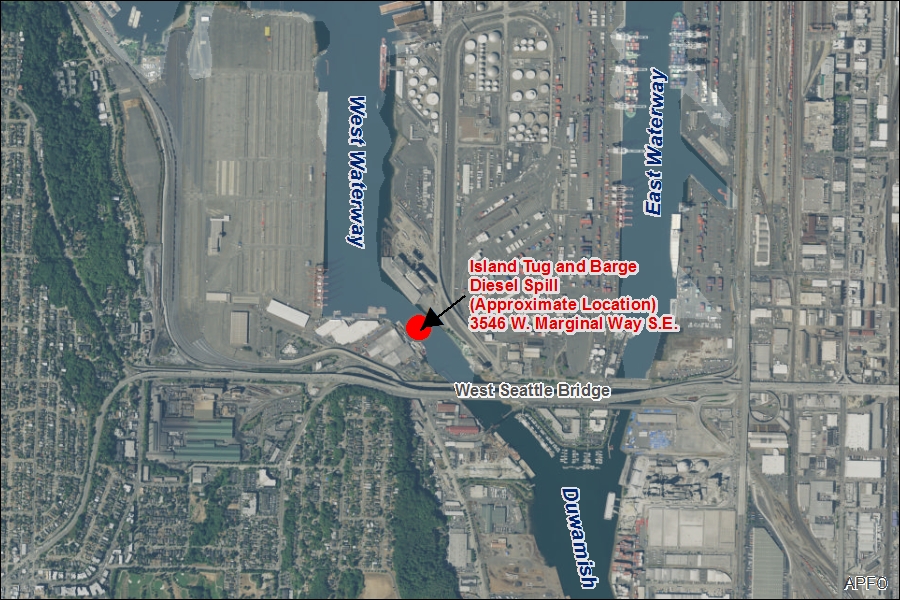Island Tug and Barge diesel spill in Seattle
The U.S. Coast Guard and Washington Department of Ecology personnel are responding to a diesel spill on the Duwamish River. The spill occurred after a tug struck a barge, causing a breach in the hull of the tug that damaged one of its diesel fuel tanks.
Summary information
3456 West Marginal Way SW, on the West Waterway of the Duwamish River

Map of the Island Tug and Barge diesel spill location.
Status updates
March 10, 2017
Ecology and the Coast Guard have reviewed and accepted an analysis of the amount of oil spilled and recovered, prepared by Island Tug and Barge’s spill response contractor, Global Diving and Salvage.
A sounding showed that the #2 port tank of the Island Wind contained approximately 1,700 gallons of diesel fuel prior to the incident. Another contractor, Sound Marine & Industrial Services, pumped 360 gallons from the tank after, leaving a spill volume of 1,340 gallons.
Measurements of cleanup pads and pumped-out oily water show an estimated 1,315 gallons recovered in the three-day response effort, most of this on the first day. Some of the approximately 25 unrecovered gallons of spilled fuel was observed on the first day as unrecoverable intermittent ribbons of sheen that extended toward Duwamish Head in Elliott Bay, as well as unrecoverable sheen at Jack Block Park and other shorelines nearby.
No observable impacts to fish and wildlife were observed or reported.
March 2, 2017
The Unified Command – Ecology, Coast Guard, Island Tug and Barge – have determined that no further cleanup can be achieved and have authorized removal of the containment boom from the spill area.
Efforts continue to calculate the amounts spilled and recovered.
There are no reports of observable impacts to fish or wildlife.
March 1, 2017
By late yesterday afternoon the rate of recovery of oil from the water had slowed significantly. The containment boom will remain in place at least for today, with some additional cleanup pads deployed in the water. This mainly will recover oil released from dock pilings over the course of a few tide cycles.
Work continues on estimating the amounts of oil spilled and recovered. This involves time-consuming work to weigh samples of oil-soaked cleanup pads and to analyze the mixture of oil and water pumped out of the tug’s ruptured tank.
Outside the boomed area, on the waterway and in the bay, bands of thin, unrecoverable sheen observed yesterday are dissipating today.
There are no reports of observable impacts to fish and wildlife.
Containment boom will remain in place at least overnight into tomorrow morning. Response crews will continue to periodically check cleanup pads deployed to recover any oil released from dock pilings by the rise and fall of the tides. The recovery rate continued to decline today.
The process of estimating the amount spilled and recovered is expected to continue into tomorrow.
There are no reports of observable impacts to fish and wildlife.
February 28, 2017
Coast Guard and Washington Department of Ecology personnel are responding to a diesel spill on the Duwamish River, Tuesday morning.
The Coast Guard, Ecology and the National Response Center were notified of the spill by the operator of Island Tug and Barge at 9:12 a.m. The spill occurred at 3456 West Marginal Way SW on the West Waterway of the Duwamish River after a tug struck a barge, causing a breach in the hull of the tug that damaged one of its diesel fuel tanks.
Island Tug and Barge and its response contractor Global Diving and Salvage contained the spill with double layers of containment boom, absorbent boom and absorbent pads. The response continues under Coast Guard and Ecology oversight.
The tank’s capacity is 9,000 gallons, however the reporting source stated it contained approximately 1,200 gallons at the time of the incident. The initial approach assumed that the entire amount could have been released.
This morning the tug boat Island Wind struck a barge in Seattle and breached its hull and fuel tank.
The spill was reported at 9:12 a.m. this morning by Island Tug and Barge. The incident occurred at 3456 West Marginal Way SW.
The tug was returning to the moored deck barge, ITB-280, carrying steel, to retrieve running lights that had been left on the barge. The tug struck the barge when it came alongside. The tug’s #2 port fuel tank was punctured, causing water to flow into the fuel tank and diesel to spill by the time the tug reached the Island Tug and Barge facility on the West Waterway of the Duwamish Waterway.
The tank’s capacity is 9,420 gallons. However, the reporting party stated it contained approximately 1,200 gallons at the time of the incident. The amount spilled is being determined.
Most was contained by boom deployed promptly by Island Tug and Barge and its contractor, Global Diving and Salvage. Unrecoverable sheen ribbons were noted at the northern end of the West Waterway and turning to the northwest in Elliot Bay with minor unrecoverable shoreline impacts.
The tug boat is moored at the Island Tug and Barge dock. Personnel from the Coast Guard, Ecology and response contractors are on scene and have contained the spill with containment boom, absorbent boom, and absorbent pads.
Response contractors continue to work to complete on-water recovery and cleanup of the discharged petroleum product. The Coast Guard and Ecology are working together to monitor the situation to ensure any further environmental threats are mitigated.
No observable impacts to wildlife have been reported.
News releases
Feb. 28, 2016, U.S. Coast Guard:
Coast Guard, Washington Department of Ecology respond to diesel fuel spill on Duwamish River

